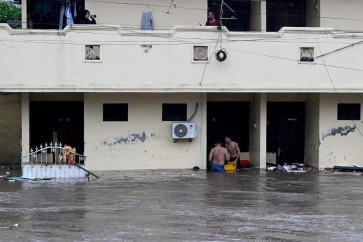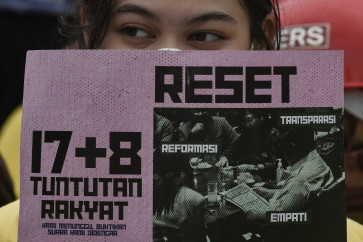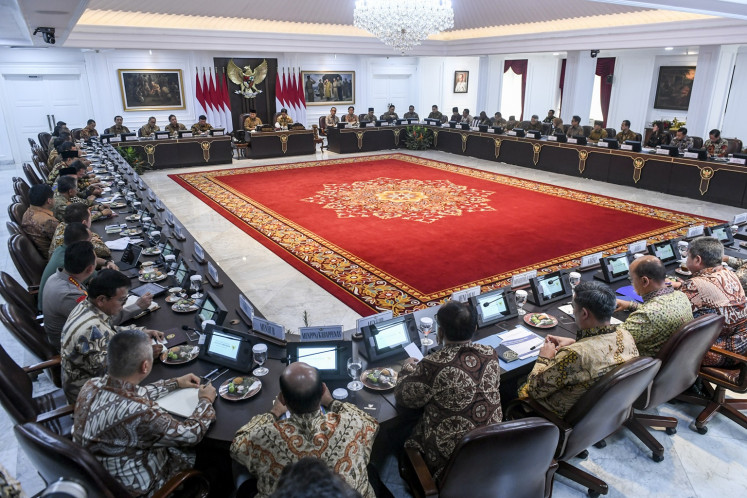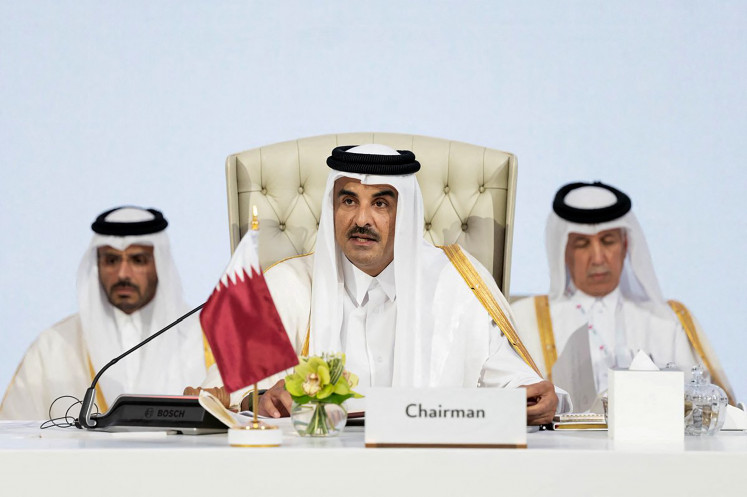Popular Reads
Top Results
Can't find what you're looking for?
View all search resultsPopular Reads
Top Results
Can't find what you're looking for?
View all search resultsA Fresh look at the legacy of Mochtar Lubis
Does Indonesia have any good journalists? We have plenty for sure
Change text size
Gift Premium Articles
to Anyone
D
oes Indonesia have any good journalists? We have plenty for sure. But do we have a good journalist who is a letter writer and artist as well as a rabble-rouser who continues to press for change in his nation?
What if we add some more qualifications: Persistency and the bravery to stand up to the establishment despite the risk of imprisonment? Very few countries have such personalities, but Indonesia is fortunate enough to have had just such a journalist in the form of Mochtar Lubis.
A renaissance man par excellence, Lubis has become the subject of countless publications that have attempted to dissect his life and works.
Recently, Routledge published a new book about the legendary journalist. However, unlike other publications with the same subject, Journalism and Politics in Indonesia—A critical biography of Mochtar Lubis by David T. Hill, a professor from the Department of Southeast Asian Studies at Murdoch University, Australia, takes a critical stance on the legendary journalist.
The book is also special in that it took the author more than 30 years to complete. The book started off as Hill’s doctoral thesis, but Hill later decided to tone down the work’s academic style to make it more accessible. He also updated the book as he worked on it.
Mochtar Lubis was born in Padang, West Sumatra, on March 7, 1922. He moved to Sungai Penuh when his father, Raja Pandapotan Lubis, was appointed by the Dutch colonial administration to serve as demang (high-ranking civil servant) of Kerinci.
It was during his stay in Sungai Penuh that he witnessed the ills of imperialism and experienced his political awakening. During the period, Mochtar witnessed how Javanese laborers working for a Dutch plantation were treated inhumanely.
Lubis’ creative awakening also took place early. When he was in elementary school, he wrote some children stories for the Medan-based newspaper Sinar Deli. Lubis studied economics at a high school in Kayutanam, which was founded by nationalist S.M. Latif.
After high school he spent a year teaching in Nias, North Sumatra, before shipping off to Batavia, now Jakarta, where he worked at a bank. World War II soon broke out, and Japanese troops invaded Indonesia.
It was during the Japanese occupation that it dawned on Lubis that independence for Indonesia was a real possibility and it was during this period that he had his first brush with journalism. During the occupation, he worked for the Japanese by monitoring international news, rewriting it into Japanese and passing the copy to Japanese soldiers.
Soon after Indonesia proclaimed its independence in August 1945, Mochtar got the chance to put his journalistic training to use by joining the pro-independence Antara News Agency. By this time, Lubis was 25, but already married with one child. In his first year as a journalist he got one important gig; covering the Inter-Asian Relations Conference. “It was a profound international baptism for the novice journalist,” Hill writes.
It helped that Lubis had a warm personality, a trait that would help him build long-lasting interactions with his colleagues as well as his sources. He had a close relationship with Indonesia’s first prime minister, Sutan Sjahrir. Lubis saw his relationship with Sjahrir as that of a mutual trust between a journalist and a political and national leader and also based on an intimate human relationship.
Despite his busy life as a wartime journalist, Lubis was left with ample time to work on some of his most important works of fiction.
It was during this time that he penned some of the country’s most important literary works, including the short story Si Jamal and the novel Tidak Ada Esok (There is no Tomorrow).
He also found time to try his hand at art. He joined the Indonesian Visual Artists Association along with some of the country’s leading artists, including Zaini, Wakidjan and Oesman Effendi. Lubis is an accomplished visual artist in his own right.
It was during this period that he also wrote and contributed for many of the country’s media outlets, including Antara, Merdeka, Masa, Masa Indonesia, Mutiara, Siasat, Gelanggang, and Indonesia Raya. It was during his stint with Indonesia Raya that he gained acclaim as an honest, no-nonsense journalist who showed his commitment as a champion of the truth.
His reports and comments were always incisive and scathing, bringing to light his ethical point of view. He bluntly criticized anything that had gone wrong, from Sukarno’s political transgression and his personal scandals, as well as social injustice and rampant corruption.
Sukarno put Lubis in jail after accusing him of cooking up reports that stated the president had illegally married a woman named Hartini. The scandal marked the beginning of a lengthy and bitter feud between Sukarno and Lubis.
When Sukarno was finally toppled in a military coup, it seemed that Lubis was poised to become a poster boy of the anti-Sukarno New Order regime.
An anti-Sukarno journalist such as Lubis could bolster the image of the New Order abroad. Lubis remained optimistic Indonesia would become a democratic polity.
But the honeymoon ended prematurely. Lubis began to sense a deja vu was brewing, and soon began ruffling the feathers of the New Order by digging deep into the actions of state officials.
Some government officials were outraged by his works in uncovering corruption in state oil company Pertamina and the scandal in the construction of the Taman Mini Indonesia Indah park, a project initiated by first lady Tien Soeharto.
When thousands of students rallied on the streets of Jakarta in January 1974 to protest the intrusion of foreign capital, Lubis threw his weight behind the motion.
However, it wasn’t until a year later that the New Order government finally arrested Lubis and while he was in jail, the regime not only disbanded Lubis’ publication Indonesia Raya, but also shut down numerous other newspapers.
Hill’s book is important for a number of reasons.
First, its subject is a phenomenal figure who looms large not only in Indonesian media but also in Indonesian politics. He was not a politician, but what he accomplished in journalism and literature has left a lasting legacy on Indonesian politics. Indonesia could consider itself lucky for having a journalist who made a significant contribution to its democracy. The book is important both for regular Indonesians and journalists as it offers a perspective on the revered life of Mochtar Lubis.
Second, Hill has done a great job as an academic writer. In spite of his bleary-eyed admiration for Lubis, Hill is able to find a balance in his roles as academic researcher and biographer. We can sense his admiration for Lubis simply through the fact that he chose Lubis as the subject of his book. Hill has been a fan of Lubis since he was at high school.
Hill shows objectivity, for instance, in questioning the softness with which Lubis wrote his report following his trip along with General Soemitro to the Buru Islands, where alleged members of the Indonesian Communist Party had been exiled.
In another part of the book, Hill tries to be objective by stating that Lubis was a member of international lobby group Congress for Cultural Freedom, an organization funded by the United States’ CIA. The congress aided Lubis in setting up his Obor foundation in 1970.
Third, this book is also important because it sets a context for Lubis’ struggle. Reading this book feels like studying the history of the Indonesian media as well as the history of the country.
Hill is successful in producing a richly nuanced account of Lubis and manages to shed light on the events that shaped life of the famed journalist.
Journalism and Politics in Indonesia—
A critical biography of Mochtar Lubis (1922-2004) as Editor and Author
David T. Hill
Routledge, 2010










